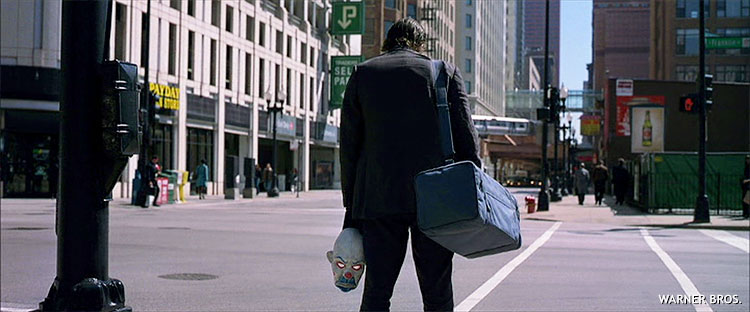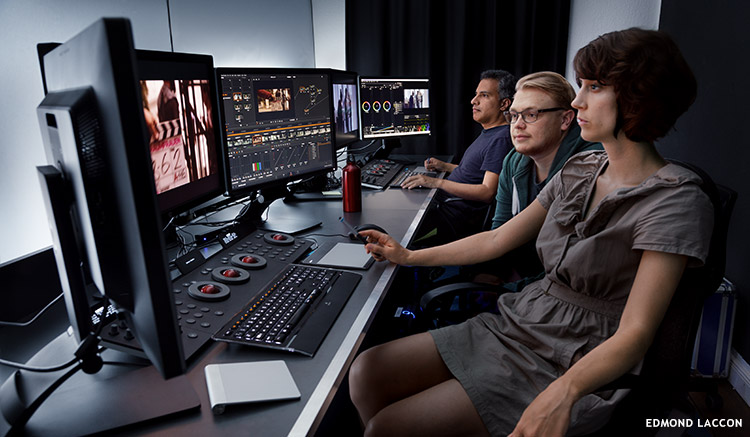UP.GRADE Berlin
So you think about applying?*
The (unofficial) frequently asked questions
One graduate's experience
Over the recent years many people have written to me asking about how it is to be a student on the DFFB’s 9 month advanced colourist course UP.GRADE in Berlin and other related questions. So I’m sharing my replies here.
*2018 UPDATE: Please note I compiled the information on this page in late 2015 as I was coming to the end of my studies on the first ever UP.GRADE programme. Since that time the programme became even better and more refined than it was then and I am honoured to say I now work for it too. Reviewing this page in 2018, I have decided to leave this information here as is it still very relevant to prospective UP.GRADERS – but please keep in mind that it dates from 2015.
 I am a……should I apply to UP.GRADE?
I am a……should I apply to UP.GRADE?
If there is anything in your professional life higher than colour grading and a love of motion picture technologies – then no, you probably shouldn’t. The course encompasses a diverse range of topics – everything from early silent film technologies to the mathematics of image rendition. These are often covered in fine detail and with painstaking precision. You will learn to adore test charts and should possess the patience for what could be loosely summarised as a German eye for the most optimal… You may spend 2 days just pouring over folder structure/naming design for best practice project media management. You might think “I can handle that, it sounds stimulating”. Well for a few weeks it’s all joyful, but that the level of stimulation runs day after day, week after week, month after month. You may end up kicking yourself for falling asleep in a class with some famous colour scientist…
Must I have a degree? The course is described as a post-graduate programme.
No, I don’t think it is mandatory at all, provided you can show that you have compelling experience in a relevant field (see later answers). It’s probably best to write and check.

What kind of person does it help to be?
Someone who wants to share and exchange knowledge and experiences with others. Someone who can spend 9 months in the company of the same 9 other students, of different ages and backgrounds, all day and practically every day.We ate together, travelled together, shared bedrooms etc. So if you ever dreamt of working on a submarine or a spaceship, in unrelenting darkness, rarely seeing the changing of the seasons – then this is the course for you! A co-operative approach to being in an international team of nerds may prove vital. Brace for cultural differences! You should also be willing to work with, and for film school students who may be much younger than yourself and of vastly different levels of experience.
How much will I be lapping up the Berlin life during the course?
In brief moments, you should at least get a feel for Berlin. They’re not kidding when they advertise the course as intense and full time meaning 5 days a week 10am-6pm. With our year, most students stayed at UP.GRADE until 10pm most days and also came in on a Saturday or Sunday. Because of the course content and the projects you work on – you will most likely want to do the same. It is highly addictive and your friends and loved ones will not see or hear much from you during it. Do not underestimate this…!
Is it possible to work on personal projects whilst doing the course?
Provided you can demonstrate that they are non-commercial in nature, yes you can. Every project is treated on a case by case basis. The UP.GRADE facilities cannot be used for working on commercial projects. Also keep in mind that working on DFFB projects is a mandatory part of doing UP.GRADE!
OK, but if I bring my own gear to Berlin, surely I would be able to work on the weekends and evenings to support myself financially?
I would say honestly you will find this very difficult. UP.GRADE is a full time programme. You will have so much information to process that the weekends become the only time to rest your mind and re-read the information you need to know to keep up with the group. In some cases UP.GRADERs who have tried to work whilst studying have ended up outsourcing their work to others! I would even venture to say its better to go into debt for UP.GRADE and pay it off afterwards than try to work whilst doing the programme. That will only undermine your learning – which is the whole point of doing UP.GRADE…
How much do I need to already know about colour grading?
A question with no easy answer. Students had been grading professionally for 1-3 years while a few had only basic grading experience. That’s not really the main basis on why you are chosen. At the most basic level its necessary to be familiar with the relevant concepts and knowing Resolve will save you some time. For me personally, having originally learned from the popular Alexis Van Hurkman book proved a good foundation for many of the topics and techniques covered on the course. Far more crucial in a way was the real world related knowledge students brought with them from their own background and experiences. To summarize, we had students who were:
- from the Camera Dept and able to build cameras and share on-set experiences.
- from Editorial, sharing stories of media management and collaboration in post.
- from the Lab, sharing knowledge of film.
- from a top level post-production company, sharing stories of working on some ‘big shows’.
- from a Commercials post house and so on…
I would say students sharing their own observations and solutions to problems formed a vital part of our course. We were all very different but everyone could help others in different areas. Age range was mid-twenties to mid-forties.
What equipment, if any, might be handy for the course?
Although by no means essential (I didn’t have it) – probably the most useful thing could be a USB3 MacBook (2012+) that can also run Windows either via Boot Camp or through something like Parallels Desktop. All of the calibration software we needed to use in various locations was Windows only.
A MacBook with Thunderbolt can likely use a Blackmagic Mini-Monitor and Resolve but most usefully it can create ProRes files which is a tad harder on Windows. Also you will almost certainly need to access both Windows NTFS and Mac HFS+ external disks, especially when working on student projects. Windows owners can install Paragon to access HFS+ disks.
Also a portable device like a laptop or tablet will also allow you to read manuals and refer to documentation whist working at pro grading stations that often do not have internet access – very useful! A large USB3 external drive will be useful too.
Having a phone capable of running WhatsApp was also vital to our group and allowed us to keep in touch and troubleshoot problems quickly via group chat. This proved a hugely useful and continues to be the first step in problem-solving almost anything! [for UP.GRADE 2016 students opted for Telegram after WhatsApp was bought by Facebook]
How much does it cost to live in Berlin during the course?
For a room, perhaps upwards of €350, rising to about €5-650+ a month [2015 prices!] for a small apartment for one person. None of us shared with each other, you kinda want a break from each other as it is. Students lived in a wide range of districts which bring their own prices (Wedding, Kreuzberg, Neukölln). Google Map directions will help you calculate the time needed to get to class at a particular time of day when you are looking for a place. You will need to get either to UP.GRADE (the stop is “U bahn Schwartzkopffstraße”) or the DFFB in Potsdamer Platz itself on a regular basis.
In terms of food, a typical lunch in the area around UP.GRADE costs between €4 and €10, but the more motivated students (not me) brought their own meals with them. A public transport card allowing unlimited travel in Berlin is included with the course which is just amazing.
Isn’t it hard to find an affordable room in Berlin?
Unless you are very lucky it is extremely hard. There are hundreds of people sitting on their smartphones, cycling to every flat within the hour. Over 30 email responses to an ad per hour is not unusual… Short term sublets (like 2 weeks) are more plentiful and easier to get than long term ones if you want to hop about to begin with. My advice would be log into WG-Gesucht and create a custom saved search for 1-3 districts you are interested in so you are emailed when you strike a match. Write a catchy re-usuable introduction about yourself, read their ad carefully (otherwise they’ll ignore you) and then adapt your introduction to what they are looking for. Send your customised plea to them ASAP. If you are not yet in Berlin you can try offering a Skype interview. To be honest if you want to share – you may actually want to consider recording a video of you introducing yourself as this is a bit like meeting you and makes you stand out. There are also these Facebook groups that can work sometimes:
Berliner Wohnungsbörse
WG-Zimmer & Wohnungen Berlin
WG, Zimmer, Wohnung in Berlin gesuch
For more general information on moving to Berlin – this site is kept pretty up to date:
http://www.settle-in-berlin.com/
What about the application process? Can you send me your application etc etc?
No I can’t, and that won’t help you – or those who put the new group together. I wrote my application over 2 weeks…I took one week just to think about the short film you’re asked to write about. The demands of the form reflect the commitment demanded by the course. The more effort you put into the application process the better your chances. I would just say put your heart into it and show who you are. It’s easier to build a team for a 9 month trans-European mission when you have a good picture of the people applying. Be bold!
I’m knocking about in Berlin and it sounds fun to try some colour grading. Being already here will give me an advantage, right?
Wrong. It won’t give you any advantage, especially if you didn’t attend any UP.GRADE events. Take at least a year to generate enough evidence of your commitment to being a colourist…
If I make it onto the UP.GRADE programme, what can I do to prepare myself?
You’ll probably benefit from watching the official introductory videos on YouTube for Baselight, Nucoda (version 2012 and up), Avid Media Composer and (if you don’t already know it) Resolve – mainly to get a feel for their interfaces. This task alone will take you some time! Having studied in detail the Conform chapter in the Resolve manual can also save you a lot of time down the road too as we sometimes used its many features as a re/pre-conform tool. Fundamental topics that come up time and time again in the chain are data vs full range, linear light vs gamma corrected. A little pre-reading about these topics (for instance from the Van Hurkman or Charles Poynton books) can help and knowing how to read a histogram and other scopes, well that’s more than essential(!)

Edmond, tell me please, is there a focus on A, B or C and will we learn X, Y and Z? Is it really worth it?
Most likely you will, as well as a whole whole lot more! I think you’ll have the greatest time, so yes it is worth it. Just being together with so many other colourists, every day for 9 months…you can learn so much.
If you want to know something more, you’re welcome to write me and I shall reply when I can, otherwise I urge you to contact the programme co-ordinator – she’s very helpful!
https://www.facebook.com/upgrade.berlin/
http://www.digital-film-services.com/
Dirk Meier’s personal site gives an additional taste of what to expect. And finally here is a nice interview with Dirk in which he outlines the course briefly:
https://mubi.com/notebook/posts/a-life-in-the-dark-a-conversation-with-dirk-meier
And finally, this how it really is…